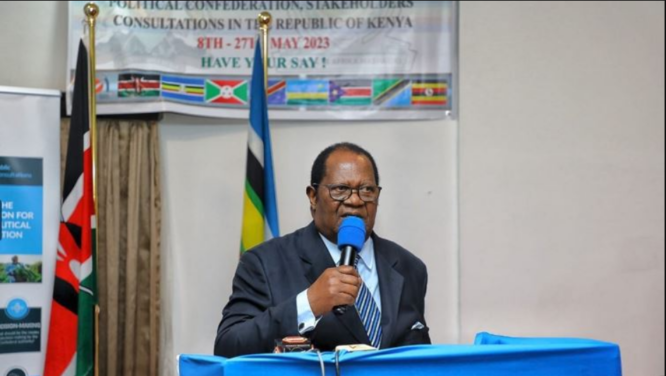Constitutional Experts Say EAC Unlocks Regional Economic Benefits 2023

Following the implementation of the proposed confederation model, fostering social and political integration within the East African Community (EAC) is expected to enhance economic growth, with border counties designated for significant development.
Thursday in Kisumu, Kenya, former Attorney General Amos Wako made these remarks during a stakeholder consultation on the formulation of the EAC Political Confederation Constitution.
Wako, who is also the Deputy Chair of the Constitutional Experts Committee, guaranteed that the Confederation would substantially address regional economic imbalances by promoting mutual benefit for member states.
“To gradually transform EAC into a well-functioning common market, a confederation assists in removing tariff barriers and different policies among other obstacles,” he said.

East African unity and free trade will benefit Kenya economically.
The team of regional eminent constitutional experts, under the direction of retired Ugandan Chief Justice Benjamin Odoki, consulted with delegates representing civil societies, opinion leaders, special interest groups, and the business community in order to determine the desired framework for establishing the East African Community Political Confederation.
Justice Odoki stated that the proposed East African Confederation aims to strengthen cooperation ties and accelerate the integration process.
In addition, he revealed that, under a confederal system, a central authority would be established to direct the policies and activities of the partner states.
“The intention was to strengthen the Community through a confederation in which each nation retains sovereignty but cedes a portion of its powers to the central authority. “This is a transitional model to transform EAC into the political federation enshrined in the treaty as the culmination of the integration process,” noted the retired Chief Justice.
Justice Odoki added that political federation would create a singular state for the region governed by a stronger secretariat or a commission with supreme authority to bind partner governments together for prosperity.
“Having one state is advantageous because it makes it easier to control the security and infrastructure development of the entire region,” he said.
According to the chairman, the public consultation procedure will continue until the middle of 2024, at which point the committee will return to the draft constitution.
Upon completion of crafting the regional constitution, Justice Odoki’s committee will present a Bill to the EAC Heads of State Summit for approval.
“We have held consultation sessions with stakeholders in Uganda, Burundi, and now Kenya.” This year, the committee plans to conclude the exercise in Tanzania and Rwanda, according to Mr. Wako, who added that South Sudan and the Democratic Republic of the Congo are on the schedule for early next year.
